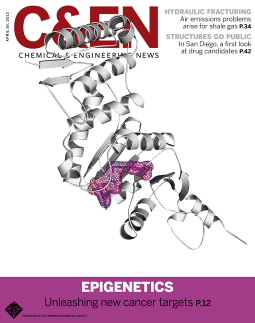FOR IMMEDIATE RELEASE
ACS News Service Weekly PressPac: April 18, 2012
Not by DNA alone How the epigenetics revolution is fostering new medicines
“Controlling the Code”
Chemical & Engineering News
Scientific insights that expand on the teachings of Mendel, Watson and Crick, and underpinnings of the Human Genome Project are moving drug companies along the path to development of new medicines based on deeper insights into how factors other than the genetic code influence health and disease. That’s the topic of the cover story in the current edition of Chemical & Engineering News (C&EN), the weekly newsmagazine of the American Chemical Society (ACS), the world’s largest scientific society.
The article, by C&EN Senior Editor Lisa M. Jarvis, focuses on the quiet revolution — in epigenetics — that has been sweeping through biology, chemistry and other scientific fields for the last several years. It explains how scientists initially believed that cracking the genetic code, achieved a decade ago, would lay out a straight path for inventing new medicines: Identify the genetic mutation behind a disease and then find a drug that overcomes it. But scientists now know that another layer of biochemical controls, an epigenetics layer, influences how and when genes work in health and disease without changing DNA itself. Early epigenetics research already produced four drugs currently approved to treat blood cancer. But these treatments lack selectivity, limiting their effectiveness.
Now, Jarvis explains, companies like GlaxoSmithKline, Epizyme and Constellation Pharmaceuticals are moving ahead to develop the next generation of epigenetic drugs, particularly for cancer. Armed with a better understanding of how specific epigenetic enzymes are implicated in disease, they are designing compounds to block the activity of those enzymes. The article describes GSK’s announcement earlier this month of an epigenetic inhibitor it has developed that might fight lymphoma. “Although no one will know the value of the new epigenetic compounds until they are tested in humans, scientists are confident that the field is moving forward with the right balance of caution and enthusiasm,” Jarvis concludes.
![]()
Contact
Science Inquiries: Michael Woods, Editor, 202-872-6293
General Inquiries: Michael Bernstein, 202-872-6042


